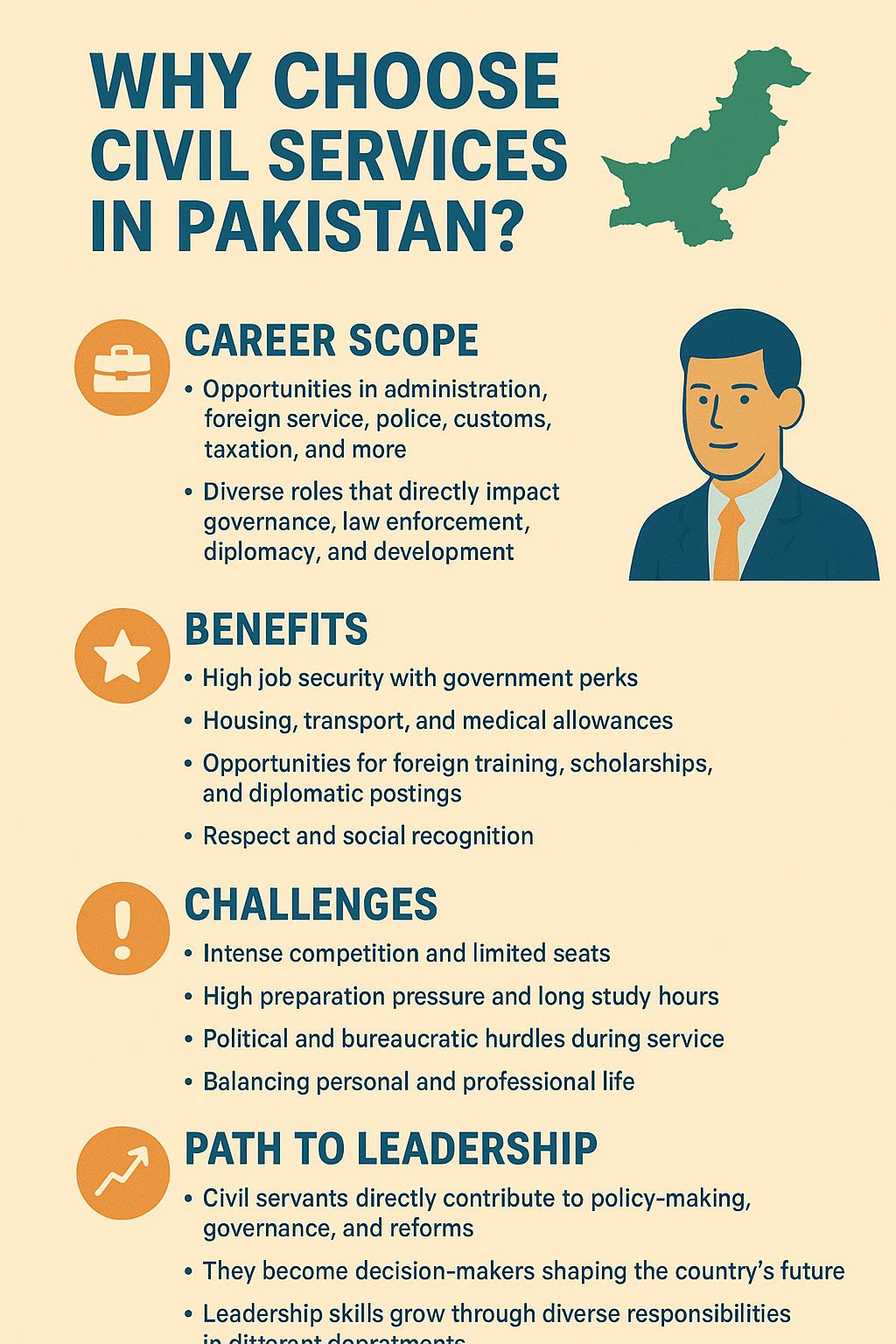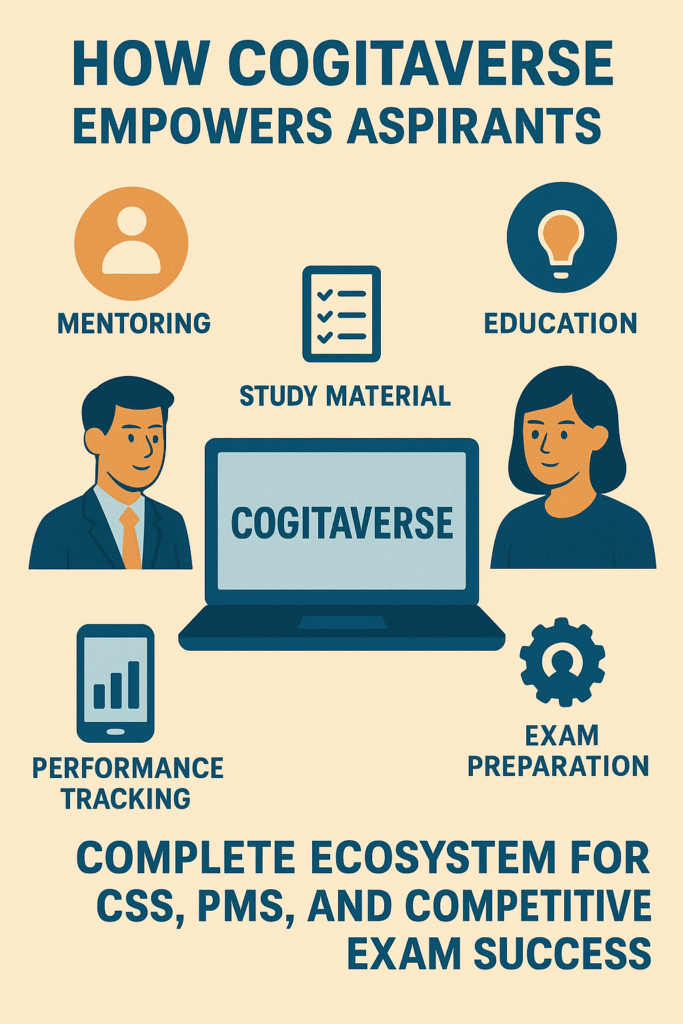The Central Superior Services (CSS) exam in Pakistan is a rigorous test of knowledge, critical thinking, and perseverance, yet it’s surrounded by myths that create confusion, self-doubt, and unrealistic expectations among aspirants preparing for 2026, 2027, or 2028. Misconceptions about luck, past papers, study hours, elite backgrounds, academies, and the first-attempt myth often mislead candidates, derailing even the most dedicated. By debunking these myths, we aim to empower you with clarity, confidence, and practical strategies to streamline your CSS preparation. This comprehensive guide, brought to you by CogitaVerse, addresses these myths with actionable tips to help you approach your CSS exam strategy efficiently. Let’s break down these myths and pave your path to success with a myth-free, evidence-based preparation plan.
Myth 1: Luck Determines CSS Success
Many aspirants believe that passing the CSS exam hinges on luck—whether it’s getting a “favorable” examiner, an “easy” essay topic, or a lenient evaluation. This myth undermines the value of hard work, creates unnecessary fear, and shifts focus from preparation to chance, leaving candidates feeling powerless.
Reality: Preparation Trumps Luck
Success in CSS exams is the result of consistent effort, strategic planning, and adaptability, not random chance. While unpredictable factors like essay topics or examiner preferences exist, a well-prepared candidate can tackle any question with confidence. To overcome the luck myth:
- Build a Strong Foundation: Study core subjects like Pakistan Affairs, Current Affairs, and English thoroughly using CogitaVerse’s expert notes and resources to master key concepts.
- Practice Adaptability: Write essays on diverse topics, such as governance, climate change, or socio-economic issues, to prepare for any curveball. Practice both geopolitical and socio-economic prompts to build versatility.
- Stay Informed: Keep up with current events through reliable sources like Dawn or The News to incorporate relevant, up-to-date examples in your answers, ensuring you can handle unexpected questions.
By developing a robust CSS essay strategy and maintaining disciplined preparation, you can make luck irrelevant. CogitaVerse’s mock tests and essay feedback can further refine your ability to adapt to any exam scenario.
Myth 2: Past Papers Are Enough for CSS Preparation
A common misconception is that studying CSS past papers alone guarantees success, with some candidates believing that memorizing answers or focusing solely on past questions is sufficient. Others dismiss past papers as outdated or irrelevant, thinking they no longer reflect the exam’s evolving nature. Both extremes are misleading.
Reality: Past Papers Are a Tool, Not a Strategy
Past papers are invaluable for understanding question patterns, examiner expectations, and recurring themes, but relying solely on them or ignoring them entirely is a recipe for failure. The CSS syllabus evolves, and questions rarely repeat verbatim, so a broader approach is essential for CSS 2026–2028 preparation. To use past papers effectively:
- Analyze Trends: Review past papers from 2020–2025 to identify high-yield topics like education reforms, CPEC, or energy crises. CogitaVerse offers curated past paper analyses tailored for 2026–2028 to highlight these trends.
- Practice Under Exam Conditions: Simulate the real exam by timing yourself—allocate 2–3 hours for essays and 1 hour for MCQs—to build speed and accuracy.
- Supplement with Current Affairs: Pair past papers with recent developments, such as 2025 data on Pakistan’s renewable energy, to keep your answers fresh and relevant. For example, if a past paper discusses energy crises, update your notes with current statistics.
- Focus on Originality: Use past papers to practice essay outlines and MCQ strategies, but avoid memorizing answers, as examiners value original, well-reasoned responses.
CogitaVerse’s resources, including mock tests and trend analyses, help you integrate past papers into a comprehensive study plan, ensuring you’re prepared for both static and dynamic syllabus components.
Myth 3: More Study Hours Equal Better Results
Many candidates believe that studying 12–16 hours a day is the key to cracking CSS, assuming that sheer hours correlate with better results. This myth often leads to burnout, inefficient learning, and diminished morale, discouraging aspirants from maintaining a sustainable routine.
Reality: Quality Outweighs Quantity
Effective CSS preparation prioritizes focused, high-quality study sessions over marathon hours. Studying 6–8 hours daily with breaks, revision, and a balanced approach is far more productive than exhausting yourself. To optimize your study hours:
- Follow a Balanced Schedule: Divide your day into 2–3 hour blocks, covering different subjects. For example:
- Morning: English Essay (2 hours)
- Midday: Pakistan Affairs (2 hours)
- Afternoon: Optional Subject (2 hours)
- Incorporate Breaks: Use the Pomodoro Technique (25–50 minutes study, 5–10 minutes break) to maintain focus. A 20-minute walk or meditation session can recharge you for the next session.
- Prioritize Weak Areas: Allocate extra time to challenging subjects like General Science & Ability, but don’t neglect your strengths to maintain a balanced skill set.
- Track Progress: Use a journal or apps like Notion to monitor study hours, topics covered, and progress. Adjust your CSS study plan for 2026–2028 based on these insights.
By focusing on quality over quantity, you avoid burnout and build a sustainable routine. CogitaVerse’s personalized study plans help you structure your time effectively, ensuring maximum productivity.
Myth 4: You Must Be From an Elite Background or English-Medium School
Some aspirants hesitate because they come from Urdu-medium schools, rural education systems, or non-elite backgrounds, believing that CSS favors those with privileged upbringings or superior English fluency. This misconception discourages capable candidates from pursuing their goals.
Reality: Background Does Not Determine Success
CSS success depends on effort, targeted preparation, and access to quality resources, not your educational or social background. Hundreds of candidates from modest backgrounds have cleared CSS and now serve in high ranks, proving that determination and strategy outweigh privilege. To overcome this myth:
- Improve English Skills: Practice daily with CogitaVerse’s essay and precis resources to enhance your writing and comprehension. Reading books like “Pakistan: A Modern History” by Ian Talbot can also improve your language and knowledge.
- Leverage Digital Resources: Platforms like CogitaVerse provide curated notes, mentorship, and feedback, bridging gaps for candidates from diverse backgrounds.
- Stay Confident: Focus on your strengths and work systematically to address weaknesses, such as English fluency or analytical skills, through consistent practice.
With effort and guidance, anyone can master the skills needed to excel in CSS, regardless of their background.
Myth 5: You Must Join a Big Academy in Lahore or Islamabad to Clear CSS
Many believe that enrolling in a prestigious academy in a major city like Lahore or Islamabad is essential for CSS success, assuming that self-study or smaller study groups are inadequate. This myth creates unnecessary pressure and overlooks accessible alternatives.
Reality: Strategy and Resourcefulness Matter More
While academies offer structure, they are not the only path to success. Many high-scoring officers have prepared through self-study, small study groups, or online platforms like CogitaVerse, which provide:
- Curated Notes: Comprehensive, syllabus-aligned resources for compulsory and optional subjects.
- Personalized Mentorship: Expert guidance tailored to your needs, available remotely.
- Real-Time Strategy Advice: Tips to refine your preparation based on the latest exam trends.
- Essay and Precis Feedback: Detailed evaluations to improve your writing skills.
Geography is no longer a barrier in the digital age. Join online communities on CogitaVerse to share insights, stay motivated, and access mock tests. A disciplined, resourceful approach tailored to your needs can outperform reliance on big academies.
Myth 6: Only First-Timers Pass CSS
A damaging belief is that if you fail CSS on your first attempt, your chances of success decline significantly, leading some to think only fresh candidates have the motivation or edge to pass. This discourages perseverance after an unsuccessful try.
Reality: Persistence and Adaptation Lead to Success
Many qualifiers pass CSS on their second or third attempt by refining their strategies and learning from past mistakes. Each attempt offers valuable lessons, such as:
- Better Optional Subject Selection: Choosing subjects that align with your strengths and scoring potential.
- Stronger Essay Practice: Improving structure, clarity, and argumentation through feedback.
- Improved Time Management: Mastering pacing for essays and MCQs under exam conditions.
Use CogitaVerse’s mock tests and past paper analyses to identify weaknesses and adjust your approach. Treat every attempt as an opportunity to grow, not a measure of your potential. Success in CSS is about learning, adapting, and staying disciplined, not instant perfection.
Additional Tips to Enhance Your CSS Preparation
To further strengthen your CSS exam strategy for 2026–2028, keep these tips in mind:
- Stay Consistent: Study daily, even for fewer hours, to build momentum. Consistency trumps sporadic, intense sessions.
- Leverage Quality Resources: Use books like “Pakistan: A Modern History” by Ian Talbot and platforms like CogitaVerse for expert notes, mock tests, and current affairs updates.
- Join a Community: Engage with fellow aspirants on CogitaVerse to share insights, exchange tips, and stay motivated.
- Focus on Mental Health: Practice mindfulness or exercise to manage stress, especially as the exam nears.
- Avoid Common Pitfalls:
- Don’t rely on cramming, as last-minute study won’t cover the vast syllabus. Start early with a structured plan.
- Don’t ignore optional subjects, as they carry significant marks. Choose wisely and study them thoroughly.
- Don’t neglect English, as poor essay or precis writing can lower your score. Practice daily with CogitaVerse resources.
- Avoid “guess papers” or unverified sources promising quick success, as they often lack credibility.
Why Choose CogitaVerse for CSS 2026–2028 Preparation?
CogitaVerse is your ultimate partner in achieving CSS success, offering:
- Expert preparation strategies tailored for 2026, 2027, and 2028.
- Curated resources, including past paper analyses, current affairs updates, and syllabus-aligned notes.
- Mock tests to simulate exam conditions and track progress.
- A supportive community to exchange tips, share insights, and stay motivated.
Visit CogitaVerse to access personalized study plans, expert guidance, and tools for a myth-free CSS journey. With strategic planning, disciplined execution, and CogitaVerse’s support, you can approach the CSS exams with confidence and clarity, ready to crush your goals in 2026, 2027, or 2028!
Proudly Powered By



